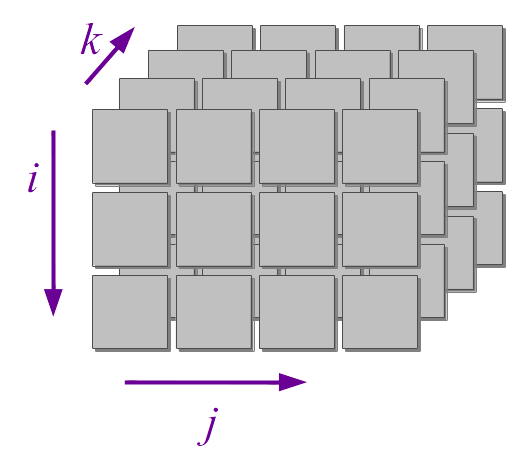func make3D[T any](m, n, p int) [][][]T {
buf := make([]T, m*n*p)
x := make([][][]T, m)
for i := range x {
x[i] = make([][]T, n)
for j := range x[i] {
x[i][j] = buf[:p:p]
buf = buf[p:]
}
}
return x
}
const m, n, p = 2, 2, 3
var x [m][n][p]float64
func make3D(m, n, p int) [][][]float64 {
buf := make([]float64, m*n*p)
x := make([][][]float64, m)
for i := range x {
x[i] = make([][]float64, n)
for j := range x[i] {
x[i][j] = buf[:p:p]
buf = buf[p:]
}
}
return x
}
X : array (1 .. M, 1 .. N, 1 .. P) of Float := (others => (others => (others => 1.0)));
double ***x=malloc(m*sizeof(double **));
int i,j;
for(i=0;i<m;i++)
{
x[i]=malloc(n*sizeof(double *));
for(j=0;j<n;j++)
{
x[i][j]=malloc(p*sizeof(double));
}
}
std::vector<std::vector<std::vector<double>>> x (m, std::vector<std::vector<double>> (n, std::vector<double> (p)));
var x = new double[m, n, p];
auto x = new real[][][](m, n, p);
var x = new List.generate(m, (_) =>
new List.generate(n, (_) =>
new List.filled(p, 0.0),
growable: false),
growable: false);
def main(m, n, p) do
if m == 0 or n == 0 or p == 0 do
[]
else
for _ <- 1..m, do: for _ <- 1..n, do: for _ <- 1..p, do: 0
end
end
X = array(M, N, P).
-spec array(pos_integer(), pos_integer(), pos_integer()) -> [[[float()]]].
array(M, N, P) -> [array(M, N) || _ <- lists:seq(1, P)].
array(M, N) -> [array(M) || _ <- lists:seq(1, N)].
array(M) -> [rand:uniform() || _ <- lists:seq(1, M)].
real, dimension(:,:,:), allocatable :: x
allocate (x(m,n,p))
x = [ [ [ k**(i/j) | k<-[1..p] ] | j<-[1..n] ] | i<-[1..m] ]
const x = new Array(m).fill(
new Array(n).fill(
new Array(p).fill(Math.random())
)
)
double[][][] x = new double[m][n][p];
BigDecimal x[][][] = new BigDecimal[m][n][p];
val x = Array(m, { Array(n, { DoubleArray(p) } ) } )
(defparameter *x*
(make-array (list m n p)
:element-type 'double-float
:initial-element 0.0d0))
local x = {}
for i=1,m do
x[i] = {}
for j=1,n do
x[i][j] = {}
for k=1,p do
x[i][j][k] = 0
end
end
end
NSArray *x=@[
@[
@[@0.1, @0.2, ... ], // p column values
... // n sub-rows
],
... // m rows
];
$x = array_fill(0, $m, array_fill(0, $n, array_fill(0,$p,0)));
var x: array [m,n,p] of double;
my @x;
my ($m, $n, $p) = (4,3,2);
my $v = 0;
foreach my $mx (0..$m-1) {
foreach my $nx (0..$n-1) {
foreach my $px (0..$p-1) {
$x[$mx][$nx][$px] = $v++;
}
}
}
my $array3d = [
[ [ 1, 0, 1 ],
[ 0, 0, 0 ],
[ 1, 0, 1 ] ],
[ [ 0, 0, 0 ],
[ 0, 2, 0 ],
[ 0, 0, 0 ] ],
[ [ 3, 0, 3, ],
[ 0, 0, 0, ],
[ 3, 0, 3, ] ]
];
x = [[[0 for k in range(p)] for j in range(n)] for i in range(m)]
n, m = range(n), range(m)
x = [[[0.] * p for _ in n] for _ in m]
def array(*dimensions, default):
def f(value, *n):
if not n:
return [default] * value
return [f(*n) for _ in range(value)]
return f(*dimensions)
x = array(m, n, p, default=0.)
x = list()
for _ in range(m):
y = list()
for _ in range(n):
z = list()
for _ in range(p):
z.append(0.)
y.append(z)
x.append(y)
x = Array.new(m) { Array.new(n) { Array.new(p) } }
let x = [[[0.0f64; P]; N]; M];
let x = vec![vec![vec![0.0f64; p]; n]; m];


